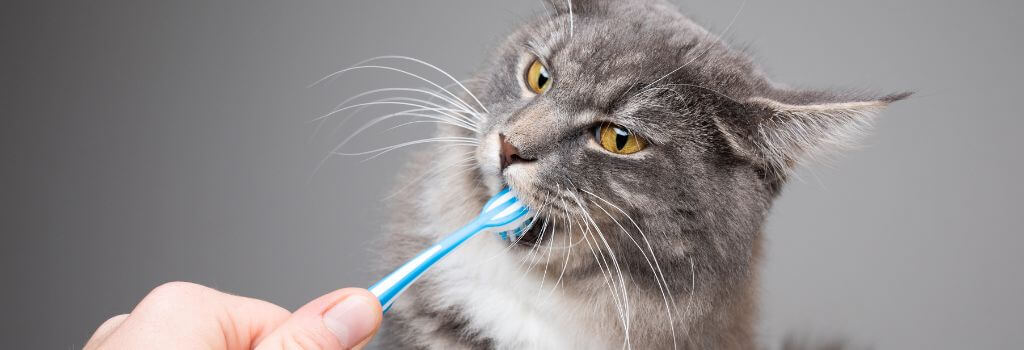If you asked any owner what kind of life they want for their cat, their answer would probably have to do with their cat having a long and healthy life. After all, who wouldn't want as many happy years with their cat as possible?
Preventive care is one of the best ways to extend your cat’s lifespan and keep them as healthy as possible. But what exactly is preventive care? And does it really benefit my cat all that much? In this blog, we’ll break down what preventive care typically entails.
What is Preventive Care for Cats?
Preventive care is essentially being proactive about your cat's health - identifying and addressing potential issues before they become serious. Preventive care includes regular veterinary visits, appropriate nutrition, grooming, parasite control, and more. The goal is to maintain your cat's overall wellness and extend its lifespan by catching concerns early and preventing illness altogether.
Neglecting preventive care can result in undetected diseases progressing, often requiring more complicated and costly treatments. Fortunately, a good preventive care routine doesn't have to be overwhelming. Below are nine key aspects that can help your cat lead a healthier, happier life.
Nutrition and Weight Management
Feeding your cat a balanced, age-appropriate diet and monitoring their weight to prevent obesity is crucial to helping them have a long and happy life. Cats have unique nutritional needs that differ from other animals like dogs, and these needs must be met in order for cats to maintain a healthy weight and have enough energy to support their daily activities as well as organ function. Because cats are meat eaters with specific nutrition needs, we recommend feeding cats diets approved by the Association of American Feed Control Officials (AAFCO) that provide your cat with adequate levels of protein, fat, carbohydrates, vitamins, minerals, amino acids, and water.
If cats are deficient in any aspects of nutrition, they can develop a number of health conditions as a result. For example, cats who eat diets without adequate amounts of taurine are at risk for developing dilated cardiomyopathy, a serious heart condition.
Keeping a cat at a healthy weight is an important part of keeping them healthy, but is something many cat owners seem to struggle with. In fact, as of 2022, a study found that 61% of cats in the United States were considered overweight or obese. While a cat's diet does greatly contribute to a healthy weight, cats will also need adequate exercise to stay trim and in good health.
If a cat does carry a few extra pounds and is considered overweight or even obese, they become at risk for joint problems, diabetes, and other health complications that can have long-lasting and far-reaching impacts.
Vaccinations
Vaccinations are a crucial aspect of any preventive health care plan for all cats. Regular vaccinations against feline diseases like feline leukemia virus (FeLV), feline viral rhinotracheitis (FVR), calicivirus, and rabies are highly recommended – and in some cases even required by state law – to guard cats against preventable diseases.
For cats, the exact recommended vaccines will vary depending on a cat's age, health status, and lifestyle, so it's crucial to work closely with your veterinarian to get a vaccination plan tailored to your specific cat and their needs.
Eye Care
Regular eye exams help detect problems early and keep your cat's vision in good condition. Your veterinarian can identify signs of irritation, infection, or structural abnormalities and offer treatments before they worsen.
Cats of any age or breed can develop eye problems, but there are a few specific breeds of cats that are prone to eye problems. They include:
- Persian and Himalayan Cats: These flat-faced (brachycephalic) breeds are prone to entropion, tear duct issues, and corneal ulcers due to their facial structure.
- Siamese Cats: Siamese cats can be genetically predisposed to progressive retinal atrophy (PRA), a condition that leads to vision loss over time. They may also have strabismus (crossed eyes) and nystagmus (involuntary eye movement).
- Burmese Cats: This breed can suffer from congenital ocular conditions such as corneal dermoids (skin-like tissue on the cornea) and glaucoma, which can lead to vision impairment or loss if untreated.
- Abyssinian Cats: Abyssinians are also at risk for progressive retinal atrophy (PRA), which causes gradual vision deterioration and can lead to blindness.
- British Shorthair: Some British Shorthairs may develop hereditary retinal degeneration, affecting their vision over time.
- Sphynx Cats: Due to their lack of eyelashes and exposed eyes, Sphynx cats are more susceptible to eye irritation, infections, and conjunctivitis.
Dental Care
Dental care is one of the most overlooked aspects of feline care. Studies report that between 50 and 90% of cats older than four years of age suffer from some form of dental disease, such as periodontal disease, gingivitis, or tooth resorption. These diseases can cause extreme discomfort, not only greatly diminishing a cat's quality of life, but also posing a risk for more serious health issues.

Regular dental check-ups and professional dental cleanings under anesthesia can help identify and resolve dental problems early before they can negatively affect the cat. Additionally, cat owners should stay on top of their cat's dental care at home by brushing their cat's teeth every day and providing veterinarian-approved toys and treats formulated to help strengthen and/or clean your cat's teeth and gums.
Spaying and Neutering
Surgical sterilizations, also called spaying and neutering, are important procedures for cats that help prevent unwanted pregnancies, reduce the risk of certain cancers and reproductive diseases, and minimize behavioral issues.
- Spaying (removing a female cat's ovaries and uterus) prevents pregnancy, eliminates heat cycles, and reduces the risk of mammary, ovarian, and uterine cancers.
- Neutering (removing a male cat's testicles) prevents reproduction, lowers the risk of testicular cancer, and curbs testosterone-driven behaviors like roaming and aggression.
Veterinarians recommend spaying or neutering kittens around 5-6 months old for optimal health benefits. Spayed and neutered cats live longer, healthier lives, with neutered males living 62% longer and spayed females 39% longer than their unaltered counterparts.
As an added bonus, appropriately spaying and neutering cats helps to resolve the United States' ever-worsening overpopulation problem with stray and unhomed cats, thus freeing up resources for shelters and rescues and allowing more stray cats to go to loving homes. So when you choose to spay or neuter, you're not just helping your own cat; you're helping the entire cat community!
Parasite Prevention
External parasites like fleas, ticks, and mites, as well as internal parasites like roundworms, hookworms, tapeworms, and heartworms can all cause major problems for cats and be total nuisances to pet owners. These pesky parasites can transmit a number of diseases to our cats and wreak havoc on their bodies and organs, with some, like heartworms, even leading to death.
Consistent use of flea, tick preventative, as well as regular deworming and fecal examinations to detect intestinal parasites like roundworms, hookworms, and tapeworms, are crucial for safeguarding your cat against the ill effects of internal and external parasites.
Grooming
While cats may be known for doing their own grooming and generally keeping themselves clean, there are a few grooming activities that owners need to stay on top of in order to keep their cat looking and feeling their best. Regular brushing can help keep your cat's coat matt free and can even aid in the distribution of natural oils, making it look shiny and healthy.
Nail trimming is also essential, especially fo indoor cats. While scratching posts and boards help, regular trims prevent overgrowth and accidental injury to people or furniture. Some cats, especially seniors or those with grooming difficulties, may benewfit from professional grooming.

Enrichment
Cats, need mental stimulation and enrichment to keep them mentally sharp and from engaging in bad behaviors as a result of boredom. Research has shown that cats living in environments that prioritize enrichment have significantly lower cortisol levels than cats who live less enriched lives.
You can enrich your cat's life by providing them with puzzles and games, allowing them to watch the world outside through a perch near a window, playing with them using interactive toys.
Senior Cat Care
As cats age, they undergo a number of physical and mental changes and often become more susceptible to illness and disease due to weakened immune systems — meaning the amount of care they'll need will also change.
Older cats may need more frequent veterinary exams to ensure that any symptoms or odd behaviors they exhibit are attributed to aging and not underlying medical conditions. Routine bloodwork and tests like urinalysis are great tools for ensuring your cat is maintaining their health as they age.
If you have questions and you'd like to reach out to us, you can call us directly at (218) 692-4400, or you can email us at [email protected]. Don't forget to follow us on social media Facebook, Instagram.

